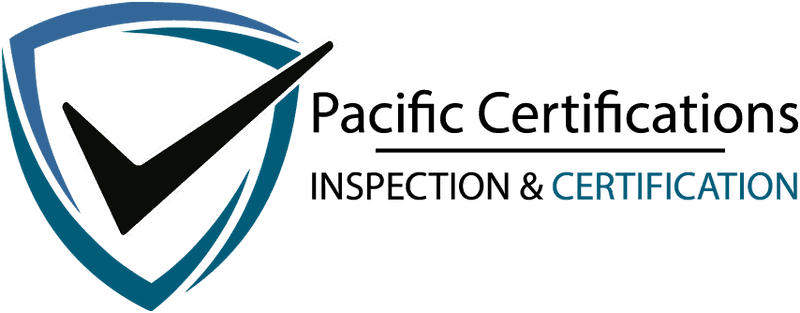ISO Certifications for Leather Manufacturing Businesses, Requirements and Benefits
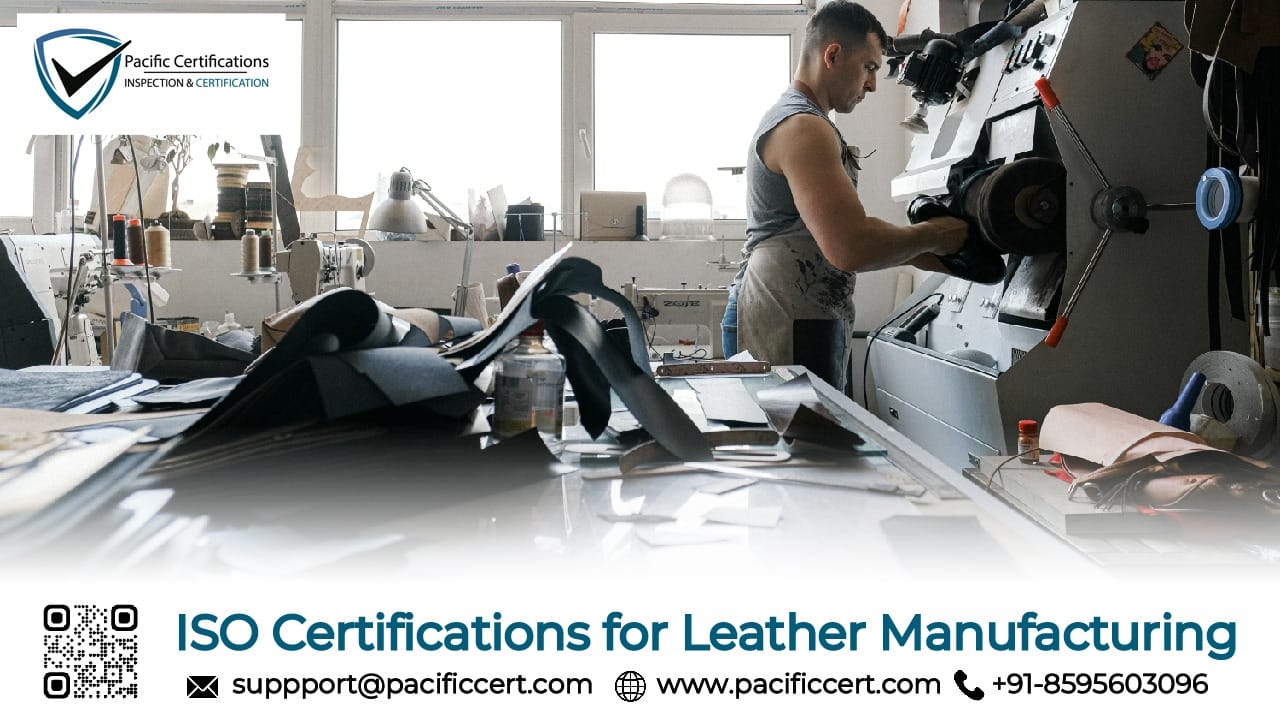
ISO Certifications for Leather Manufacturing
In an ever-evolving global market, leather manufacturers face growing challenges related to quality, sustainability, and compliance. The leather industry, valued at billions globally, is increasingly under scrutiny for its environmental impact and labor practices. ISO certifications for leather manufacturing provide a framework to address these concerns while fostering trust and efficiency.
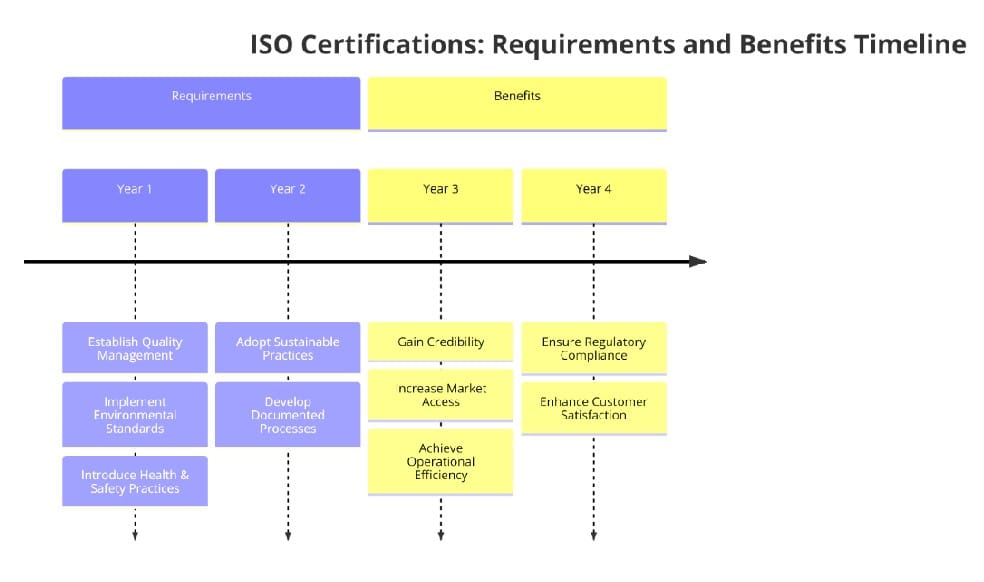
Introduction to ISO Standards for Leather Manufacturing
The International Organization for Standardization (ISO) has been a cornerstone for setting global standards across industries. In leather manufacturing, these standards are pivotal in ensuring quality, sustainability, and ethical practices.
Leather production involves intricate processes like tanning, dyeing, and finishing, which require rigorous quality control. Moreover, customers and regulatory bodies demand adherence to high environmental and social standards. ISO certifications, such as ISO 9001 for quality management and ISO 14001 for environmental management, offer a standardized approach to achieving these goals.
By implementing ISO standards, leather manufacturers can demonstrate their commitment to quality, safety, and sustainability.
If you're seeking ISO certification for leather manufacturing, reach out to us at [email protected] or call +91-8595603096 for expert assistance.
Applicable ISO Standards for Leather Manufacturing
ISO standards relevant to leather manufacturing encompass a variety of domains, from quality management to sustainability. Here’s a detailed look at the key certifications:
ISO 9001: Quality Management Systems (QMS): ISO 9001 ensures that leather manufacturers consistently deliver products that meet customer and regulatory requirements. It emphasizes process optimization, risk management, and continuous improvement, critical for maintaining product quality in a competitive market.
ISO 14001: Environmental Management Systems (EMS): This certification is vital for addressing the environmental impact of leather production. ISO 14001 encourages resource efficiency, waste management, and compliance with environmental regulations, helping manufacturers align with sustainability goals.
ISO 45001: Occupational Health and Safety Management Systems (OHSMS): Leather manufacturing involves potentially hazardous processes. ISO 45001 promotes a safe and healthy work environment by identifying and mitigating workplace risks, enhancing employee well-being and productivity.
ISO 50001: Energy Management Systems: Given the energy-intensive nature of leather production, ISO 50001 helps manufacturers optimize energy usage, reduce costs, and minimize their carbon footprint.
ISO 26000: Social Responsibility: While not a certification, ISO 26000 provides guidance on integrating social responsibility into leather manufacturing. It emphasizes ethical labor practices and community engagement.
ISO 17025: Testing and Calibration Laboratories: For leather testing laboratories, ISO 17025 ensures accurate and reliable test results, enhancing the credibility of product claims regarding durability, safety, and performance.
ISO 20400: Sustainable Procurement: These standard aids leather manufacturers in sourcing materials responsibly, ensuring suppliers adhere to ethical and environmental criteria.
Click here to find out more applicable standards to your industry
At Pacific Certifications, we specialize in auditing and issuing ISO certifications tailored to the leather manufacturing industry. With years of expertise and a global presence, we guide businesses through the complex certification process, ensuring compliance and credibility.
Our audit services are designed to evaluate your organization's readiness for certification, focusing on adherence to relevant ISO standards. By partnering with us, leather manufacturers can showcase their commitment to excellence, sustainability, and safety.
Looking to achieve ISO certification for your leather manufacturing processes? Email [email protected] or call +91-8595603096 for guidance.
Requirements of ISO Certifications for Leather Manufacturing
Achieving ISO certification requires meeting specific criteria, which vary depending on the standard. Here’s a summary of the common requirements:
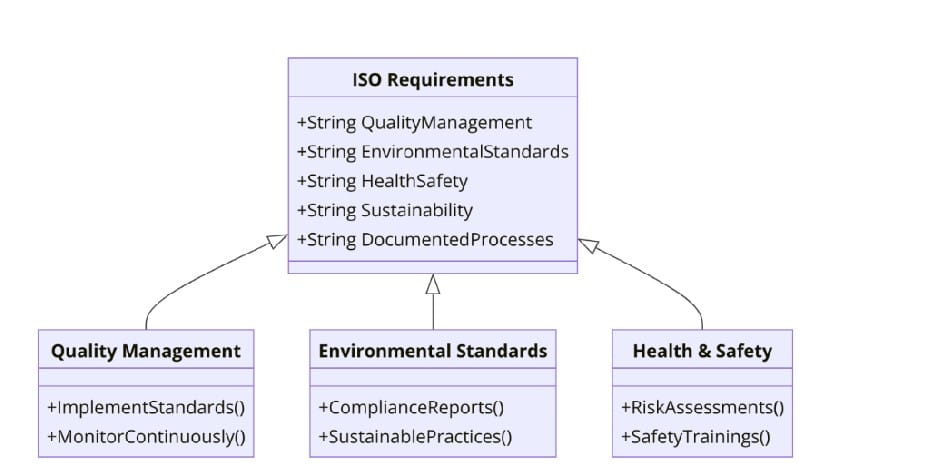
For ISO 9001 (Quality Management)
- Development of a documented quality management system.
- Regular monitoring and evaluation of production processes.
- Training and development of staff to maintain high-quality standards.
- Customer feedback mechanisms to drive improvement.
For ISO 14001 (Environmental Management)
- Identification of environmental aspects and impacts related to leather manufacturing.
- Establishing objectives to reduce waste, emissions, and resource usage.
- Compliance with local and international environmental regulations.
- Regular internal audits to ensure system effectiveness.
For ISO 45001 (Health and Safety)
- Implementation of safety policies and procedures.
- Regular risk assessments and mitigation strategies.
- Emergency preparedness plans for workplace incidents.
- Employee training programs for occupational safety.
For ISO 50001 (Energy Management)
- Conducting energy reviews to identify significant energy uses.
- Setting measurable energy efficiency goals.
- Monitoring and optimizing energy consumption.
- Documenting energy policies and performance improvements.
For ISO 20400 (Sustainable Procurement)
- Engaging with suppliers to ensure adherence to ethical sourcing practices.
- Developing procurement policies aligned with sustainability objectives.
- Auditing supplier compliance with environmental and labor standards.
Trust Pacific Certifications for a seamless ISO certification process in leather manufacturing. Get in touch at [email protected] or dial +91-8595603096.
Benefits of ISO Certifications for Leather Manufacturing
ISO certifications offer numerous advantages for leather manufacturers, including:
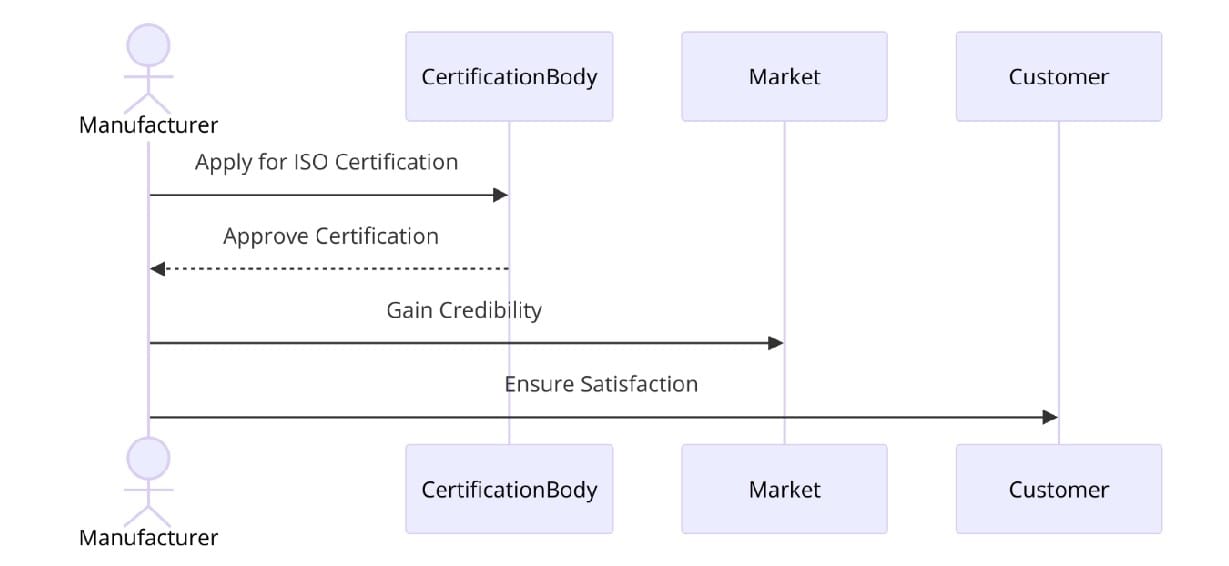
Product Quality: ISO standards ensure consistency and quality, meeting the expectations of global customers.
Sustainability: By adopting ISO 14001 and related standards, manufacturers can reduce their environmental footprint, aligning with growing consumer demand for eco-friendly products.
Regulatory Compliance: ISO certifications streamline compliance with national and international regulations, minimizing legal risks.
Efficiency: Standards like ISO 9001 and ISO 50001 enhance process efficiency, reducing waste and costs.
Competitive Advantage: Certification sets businesses apart, signaling reliability and commitment to best practices to stakeholders.
Workforce Safety and Satisfaction: ISO 45001 ensures a safer workplace, boosting employee morale and productivity.
Marketability and Credibility: ISO-certified manufacturers gain trust from customers, investors, and partners, opening doors to new markets.
In 2024, the leather industry is witnessing a significant shift towards sustainability and innovation. According to recent reports, global leather manufacturers are increasingly adopting circular economy practices, recycling leather waste, and exploring alternatives like bio-based tanning agents.
Additionally, rising consumer awareness about ethical sourcing has prompted companies to strengthen their supply chain transparency, with ISO standards playing a pivotal role.
A notable trend is the integration of digital technologies, such as IoT and AI, in leather production processes to enhance traceability and quality control. These developments underscore the importance of ISO certifications in maintaining industry relevance and consumer trust. If you are looking for support for your certification process, Pacific Certifications is here to help.
Our expert auditors ensure a seamless certification process, empowering you to meet industry standards and exceed customer expectations.
Pacific Certifications is accredited by ABIS, in case you need support with ISO certification for your Leather Manufacturing business, please contact us at [email protected] or +91-8595603096.
FAQs: ISO Certifications for Leather Manufacturing
What is the role of ISO certifications in leather manufacturing?
ISO certifications help leather manufacturers meet quality, environmental, and safety standards, ensuring regulatory compliance and competitive advantage.
How does ISO 14001 benefit leather manufacturers?
ISO 14001 aids in reducing environmental impact through efficient resource use, waste management, and adherence to environmental regulations.
Can Pacific Certifications assist with ISO training or implementation?
No, Pacific Certifications specializes in audits and certification issuance but does not offer consultancy or training services.
Why is ISO 45001 important in leather manufacturing?
ISO 45001 promotes workplace safety by identifying risks and implementing measures to prevent accidents, ensuring employee well-being.
What are the costs of obtaining ISO certifications for leather manufacturing?
Costs vary depending on factors like company size, chosen standards, and certification body fees. Contact Pacific Certifications for a tailored quote.
Is ISO certification mandatory for leather manufacturers?
While not mandatory, ISO certification demonstrates compliance with international standards, offering significant business advantages.
Read More at: Blogs by Pacific Certifications
